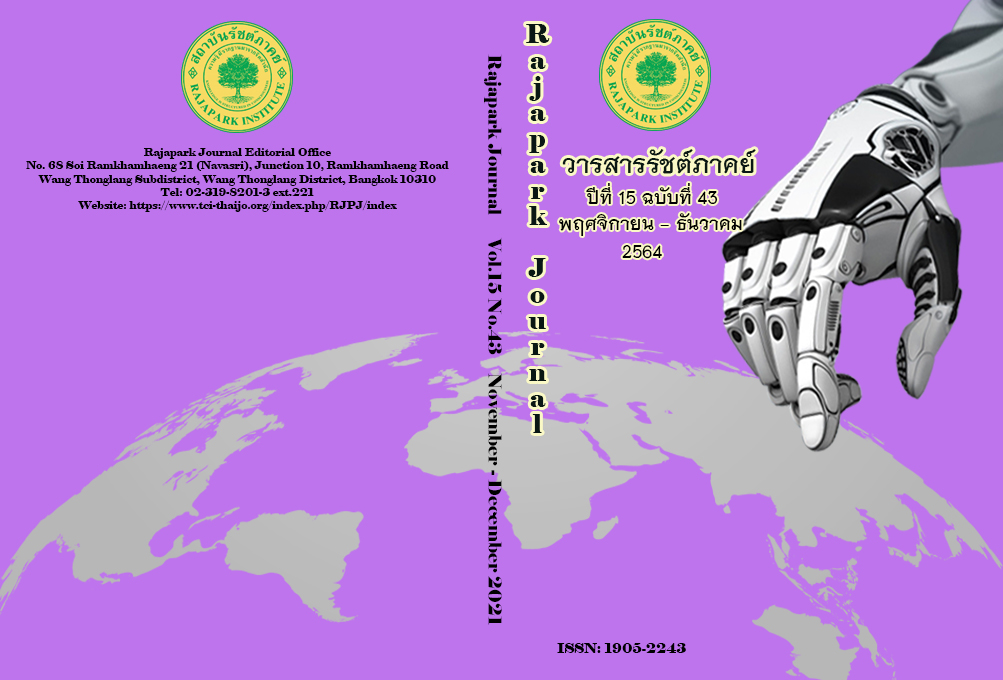Online Learning Management in New Normal for Upper Elementary School Students
Main Article Content
Abstract
The purposes of this research were to study (1) the online learning management model in the new normal for upper elementary school students; (2) the effectiveness of the online learning management model; and (3) guidelines for developing online learning management to be appropriate to the context of the school effectively. The research type was mixed-method research. This was designed by creating an online questionnaire and sent to the sample group. There were 148 students in grades 4-6 from Ongkarak Demonstration School, out of a total of 208 students who voluntarily provided information and responded to the online questionnaire. Research tools were questionnaires, interviews, and satisfaction assessment forms. Data were analyzed using mean, standard deviation, percentage, and content analysis. The findings revealed that: 1) online learning management model consisted of 4 steps as follows: survey and analysis, preparation and plan, Implementation and monitor, and evaluation and reflection; 2) effectiveness of online learning management model found that students had a good level of availability of the tools they use for online learning, they had a good level of online learning behavior, and students’ satisfaction was at a high level; and 3) school should develop about online learning management in the field of organizing management, learning activities, technology media, teacher, student, and parents to be effective and appropriate to the school context.
Article Details
Views and opinions appearing in the Journal it is the responsibility of the author of the article, and does not constitute the view and responsibility of the editorial team.
References
Banlue, S. (2017). The Suitable Model of Online Learning and Teaching for Ubon Ratchathani Rajabhat University. Journal of Roi Et Rajabhat University, 11(2), 250-260.
Best, J. W. (1981). Research in Education. Englewood Cliff: Prentice-Hell.
Boonphak, K. (2020). Learning Management in the New Normal. Journal of Industrial Education, 19(2), 1-6.
Boonphakdee, P. (2020). Evaluation of Online Teaching and Learning in the New Normal. T-VET Journal, 4(8), 47-62.
Boonsiriphan, M. (2020). Get to Know "New Normal" from the Royal Society of Thailand. Retrieved February 5, 2021, from https://news.thaipbs.or.th/content/292126
Chaithada, P. (2020). Learning Management Using e-Learning (EDU-Learning) in the Analytical Chemistry Course. Narkbhutparitat Journal Nakhon Si Thammarat Rajabhat University, 12(2), 150-159.
Chowprasith, P., Teemueangsai, S., & Poponsak, P. (2019). The Survey of Online Learning Management Problems that Enhance Imagination and Creativity Thinking for Primary Student under The Office of Roi-Et Primary Education Area Office 1. UMT Poly Journal, 16(1), 1-14.
Ferri, F., Grifoni, P., & Guzzo, T. (2020). Online Learning and Emergency Remote Teaching: Opportunities and Challenges in Emergency Situations. Societies, 10, 1-18.
Jaturanon, W., Chanchoengyattachai, S., Kaensan, S., & Panmanee, R. (2020). A Study of Online Learning Behaviors and Satisfactions Towards Chinese Language Online Learning Management of the Bachelor of Education in Chinese Students, Faculty of Education, Burapha University, Summer Semester, Academic Year 2019 According to Vigilant Measures Against the Spread of Coronavirus (2019-nCOV). Journal of Faculty of Chinese Language and Culture, 7(2), 291-310.
Kraisin, A., Sangkhaosuthirak, S., & Jaroensuk, B. (2021). The Development of Internal Supervision Process of Primary Schools in Thachang District under Suratthani Primary Educational Service Area Office 2. Rajapark Journal, 15(41), 296-309.
Maesincee, S. (2020). The World Changes, People Adaption, Preparing Thai People to Become Perfect Human Beings after Covid-19 Situation. Retrieved February 10, 2021, from https://waa.inter.nstda.or.th/stks/pub/2020/20200506-2-the-world-changes-covid19.pdf
Neadpuckdee, R., Kongsumruay, K., Krommoi, A., & Phangkham, T. (2020). New Normal with Guidelines of Educational Management in Thailand. Academic Journal of Mahamakut Buddhist University Roi Et Campus, 9(2), 752-763.
Oxford Dictionary. (2021). New Normal. Retrieved February 8, 2021, from https://www.lexico.com/definition/the_new_normal?locale=en
Pandam, S. (2020). New Approach of Learning of Vocational Education in Post-Covid-19. T-VET Journal. 4(7), 4-16.
Pinyosinwat, P. (2020). How to Organize Teaching and Learning in the Situation of COVID-19: from Foreign Lessons to Thai Learning Management. Retrieved February 15, 2021, from https://tdri.or.th/2020/05/examples-of-teaching-and-learning-in-covid-pandemic/
Sangsawangwatthana, T., Sirisaiyas, N., & Bodeerat, C. (2020). “New Normal” A New Way of Life and Adaptation of Thai people after Covid-19: Work Education and Business. Journal of Local Governance and Innovation, 4(3), 371-386.
Sanjaiprom, S., & Intanate N. (2018). A Model for Developing the Mentor Teachers’ Roles in Promoting the Student Teachers’ Learning Management Abilities. Journal of Education Naresuan University, 20(3), 210-223.
Srisapan, M., Puthaprasert, C., Yaboonthong, Y., & Rupavijetra, P. (2020). The Model of Integrated Learning Management to Develop Learning in the 21st Century for Students of Northeast Sports School. Interdisciplinary Research Review, 15(5), 46-54.
Santiago, B. J. et al. (2020). Learning Management System-Based Evaluation to Determine Academic Efficiency Performance. Sustainability, 12, 1-17.
Teachdentshare. (2021). Online Teaching Support Tools. Retrieved July 15, 2021, from https://www.teachdentshare.com/
Tharahorm, T. (2019). An Online Instruction Learning Model with 6Ts Techniques for Enhancing Reading Skills of Undergraduate Students. Humanities and Social Sciences Journal, Ubon Ratchathani Rajabhat University, 10(1), 79-93.
Thomas, D. (2020). Thailand University Students’ E-Learning Behavior during the Global Pandemic. Human Behavior, Development and Society, 21(4), 57-65.


